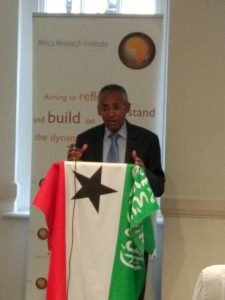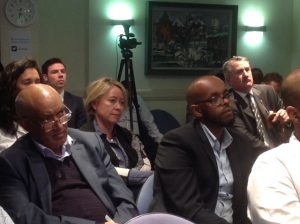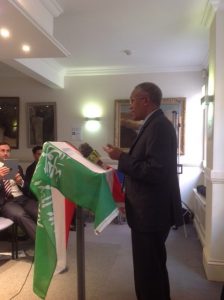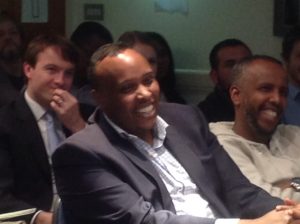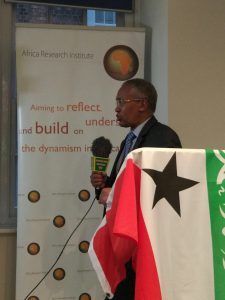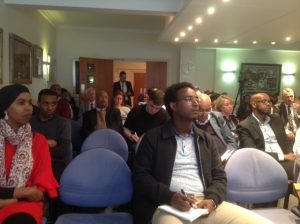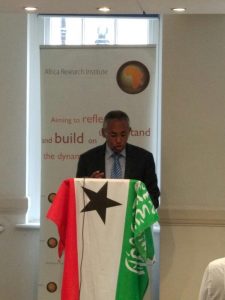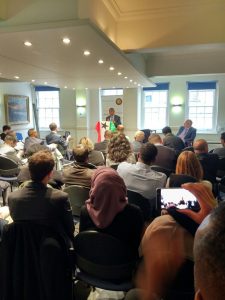On Thursday 20 April Africa Research Institute hosted HE Dr Sa’ad Ali Shire, Minister of Foreign Affairs, Somaliland, who addressed guests and answered questions on a wide range of issues including Somaliland’s role in the region, its electoral record, the impact of the devastating drought, DP World’s US$442 million investment in the port of Berbera and the lease of a military base to The United Arab Emirates (UAE).
Here is an abridged version of Dr Shire’s speech and a representative sample of the Q & A:
On the history of Somaliland
“We always feel Somaliland is not as well-known as we think it should be. We want people to understand where we are coming from.
Somaliland was declared a British protectorate in 1887. Between 1888 and 1897 international boundaries were established in agreement with colonial and neighbouring powers. Somaliland was on the map. For 70 years it existed as a country and on 26 June 1960 it was granted independence on the same day as Madagascar.
After five days we rushed into a decision which we regretted for the next 30 years: the new State of Somaliland joined in a union with [the former Italian-administered territory of] Somalia to create the Somali Republic. The way the union was effected was legally questionable. Our people soon sensed that they were not being dealt with fairly. In June 1961, a majority rejected the official constitution of the new republic and Act of Union in a referendum. Six months later, a group of Somaliland military officers unsuccessfully attempted a coup d’état. Somalilanders felt their expectations of the union with Somalia were not being matched by reality.
In October 1969 a military coup led by Major-General Mohamed Siad Barre toppled the democratically elected government of the Somali Republic. The junta stayed in power until 1991. During its time in power Somaliland was under continual pressure: the people felt mistreated, marginalised and discriminated against. In 1981 the Somali National Movement (SNM) was founded. Resistance to the junta grew steadily and skirmishes more frequent. In 1988 full-blown war broke out, with the regime in Mogadishu retaliating against the SNM in an almost genocidal manner. Hargeisa, the capital of Somaliland, was utterly destroyed by artillery fire from bases around the city and planes launched from its own airport; 50-100,000 people lost their lives and about 500,000 were displaced.
In 1991, the regime was defeated in Somaliland and the government in Mogadishu was overthrown. In May, Somaliland leaders, statesmen, intellectuals and the people in general met at the Grand Conference of the Northern Peoples in Burao and decided to leave the Union and proclaim independence. A series of meetings to reconcile the people after the civil war ensued.
The peacebuilding process in Somaliland was an indigenous one. Help was offered from outside the country but Somalilanders decided not to accept because this would have involved conditions and timetables. People just wanted to talk, to reconcile, without time limitations. Of course the process did not always go smoothly, but finally, in 2001, a constitution was put to the people. It was approved by 97%, a majority of the population.
On political development and elections
Somaliland has held a series of successful elections since reclaiming its independence. Municipal elections were held in 2002 and 2012; presidential elections in 2003 and 2010; and parliamentary elections in 2005. All five elections have been internationally monitored and declared free and fair. There have been delays – three times in the case of the parliamentary elections. We are not proud of that. Democracy is not just about elections, it is about timely elections. Parliament has been sitting far too long. The issue of regional allocations within parliament is still to be resolved and the guurti, the upper house, is the ultimate authority on holding elections.
This year’s presidential election, scheduled for March, has also been postponed to November. We know that the UK and other friends are upset about this delay. We have a special relationship with Britain and wouldn’t be able to finance elections without their support and that of other friends. But it just couldn’t be done. We couldn’t have held an election with the drought at its peak and so many of our people displaced.
Somaliland has a very important role in the region. It is the most democratic country in the region. It has a liberal economic system. We have achieved peace through our own efforts and processes, without outside intervention, and we have a constitution that guarantees the right to free speech. We have established good relations with our neighbours and have succeeded in maintaining peace and security in a very troubled region. Somaliland is a role model, I think, a positive influence.
As far as Somalia is concerned, Parliament gave the government authority to hold general discussions with them. To date there have been eight meetings, but so far little has come of them.
On social development
Somaliland has made progress in social and economic development despite non-recognition. Hargeisa, the capital, was rubble in 1988. Today it is a thriving metropolis of almost one million inhabitants. We did this ourselves. There were hardly any schools left by the end of the civil war. Any teaching that took place was done under trees or corrugated iron. By 2015, however, Somaliland had 1,200 primary and secondary schools with 290,000 children enrolled. We also have 30 registered universities with 30,000 students enrolled.
The health sector was also totally destroyed. We had to start from scratch. Now we have 230 health facilities – 16 public and 15 private hospitals, 101 mother and child units and 181 health posts. International partners have been very supportive in this area.
We still have real problems with water supply. This is as much an issue of management as of scarcity, although I think we have made some progress.
On economic development
The decision to enter into an agreement with DP World for the development of Berbera port, and with UAE for the lease of a military base, are economic decisions. The two deals are entirely separate. The rationale for developing Berbera into a modern port, including an 800 metre extension to the existing facilities, is self-evident. Among other reasons, Somaliland has a huge trade deficit with Ethiopia and an expanded port will help to redress this while assisting Ethiopia to reduce its dependency on port facilities in Djibouti.
As far the base is concerned we will get a new 250km road worth US$100-200 million, to link Berbera and Hargeisa to the Ethiopian border at Wajaale; a new cargo airport at Berbera, worth US$30-50 million; and other social and economic infrastructure which is still the subject of negotiation. We also have secured access to the UAE labour market, which is very important given high youth unemployment. The imperative of job creation is absolutely in the forefront of our minds.
Some people have suggested that there are risks and downside to the agreements, particularly the one relating to the military base. There are always risks in every investment. Every decision you make has a downside. But we have judged these agreements to be to the overall benefit of the people of Somaliland and the region. We have consulted our neighbours and friends closely: we would not do anything to endanger the security of our neighbours because ultimately that would have an adverse effect on us.
I must speak about the drought that started in October 2016. Although it affects the whole of East Africa, it is the worst in living memory in Somaliland and Somalia. Somaliland is predominantly a pastoral economy and pastoralists have lost two-thirds of their livestock. That tells you how severe the situation is. Businesses and the diaspora have joined hands and are doing a remarkable job in providing relief, as is the international community. But we will need international help to address the fact that droughts used to occur every ten years or so, now it’s every other year. Climate change and population pressure are really biting in the region.
On recognition as a sovereign state
In 2005, an African Union (AU) fact-finding mission assessed Somaliland. It commented that “the fact that the Union between Somaliland and Somalia was never ratified and that it malfunctioned makes Somaliland’s search for recognition historically unique and self-justified in African political history”. The mission recommended that the AU should find a way of dealing with Somaliland as a “special case” and should be disposed to judge the situation from a historical standpoint.
Somaliland is not yet recognised internationally but it is a de facto state and fulfils all the requirements of a sovereign state. It has a defined territory; a government in authority; the authority to enter into agreements with states, corporations and international organisations; its own army, police force and currency; and four million people who consider themselves Somalilanders. Our case is convincing. In meetings with senior government officials of more than 20 states no one has ever told me otherwise.
There is a downside to not being recognised – non-recognition imposes a lot of challenges to our continued development. For example:
- We cannot access funding for infrastructure from certain types of lender, including the World Bank, the African Development Bank and Islamic banks
- We cannot be granted bilateral aid – aid must be channelled to us through a third party
- It is harder to attract foreign investment. We have plenty of interest from potential investors but they do not leave much of a footprint
- Travel opportunities are limited for people with only a Somaliland passport
- We have limited participation in international fora, even ones whose decisions affect us.
I believe the region and the world are poorer for the fact that Somaliland is not recognised. I do not think anyone is benefitting from non-recognition, but a great many people are losing out. I am confident the situation will change – I hope sooner rather than later.”
Selected questions from the audience
Q. Somalia is less secure and more corrupt than Somaliland but receives a lot more support from the international community? How do you explain that and how does it affect your government?
We have a blessing and a problem called the good child syndrome problem. The naughty child gets the attention. People seem to take for granted what is happening in Somaliland and prefer to fight fires in Somalia. In a way that creates an atmosphere where bad behaviour is rewarded and good behaviour penalised, which I do not think is right. There needs to be a balance. Of course Somalia needs help. We ourselves have helped her, for example during the last drought in 2011. But lack of attention hinders our efforts to deal with things like the current drought. Somalia receives external assistance amounting to about US$2 billion a year, much of it for AMISOM, whereas Somaliland receives about US$100-150 million a year.
Q. Regarding the deal with DP World over Berbera port and the lease of a military base to UAE, is non-recognition of Somaliland forcing the government to “sell the family silver”?
A. We certainly do not see it that way. We’re trying to add to the silver!
Q. There are reports of increasing, large-scale land-grabbing in Somaliland. What legal power exists to counter this?
A. According to our constitution all land belongs to the state. There is no freehold. In the British colonial era Somaliland was zoned: there were demarcated urban areas, agricultural areas and pastoralist reserves. This system has fragmented. Land-grabbing has become a big problem, particularly for pastoralists whose corridors for moving livestock are now blocked by people laying claim to the land. I think that is wrong and we must do something about it. The problem is the implementation of policy and the law. We are trying to improve this by producing a single Land Act.
Q. The history of modern Somaliland is related as if it is all about the SNM. What about Awdal and other regions?
A. I agree that not everyone involved in defeating Somali government forces rebuilding Somaliland after the civil war was SNM, but the SNM is part of our history – just like the union with Somalia is part of our history. We need to be fair to all parties in creating and relating our history. I mentioned the role of Borama in the peacebuilding process – the role of everyone should be acknowledged and where there is bias it should be countered.
Q. Might Somaliland advance the case for international recognition by becoming an associate member of The Commonwealth?
A. We believe we tick all the boxes for being a full member of The Commonwealth, but in the interim we would like to be associated in one way or another.
Q. What guarantees does the government have regarding aggressive use of the military base being leased to UAE, for example in Yemen operations?
A. A military base is a military base. I quite understand that there are legitimate concerns. But there are others in the region. Think of the multiple bases in Djibouti or UAE’s base at Assab, Eritrea. I am not aware of any negative repercussions for host countries of these bases.
Q. Is the government trying to silence anyone discussing or opposing the DP World and military base deals?
A. There is never a good reason why voices should be silenced. Of course when you are negotiating deals you cannot discuss all the details in public. Transparency and consultation is important, but so is securing a good deal. Some terms will always remain confidential, as they would in any country in the world. Both deals were approved by Parliament.
Q. Is the government in Mogadishu trying to disrupt the DP World deal and lease of the military base to UAE?
A. The Government of Somalia has no authority whatsoever in Somaliland as far as Berbera is concerned. The deals are none of its business. Those with whom we signed the deals know exactly what the situation is. They negotiated with Somaliland as a state and they know what they are doing.
Q. While negotiating with UAE did you ask them to recognise Somaliland formally?
A. You can be sure we asked – we ask everybody we have dealings with! But in negotiation you do not always get everything you want. You can only push conditionality so far.
Q. What is being done to combat youth unemployment and emigration?
A. These are huge problems for Somaliland and the whole region. We are not happy that our young people risk their lives migrating, in an attempt to fulfil their aspirations elsewhere. The way to deal with it is to create jobs and that is done by attracting investment. In this respect, Somaliland would be given a substantial boost if our friends and partners would formally recognise us a sovereign state. We also need to re-examine education. It is very academic – there are too few technical schools. We need to address this.
Podcast:







